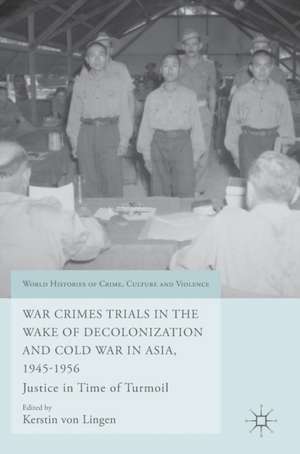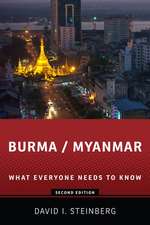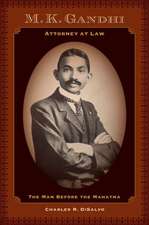War Crimes Trials in the Wake of Decolonization and Cold War in Asia, 1945-1956: Justice in Time of Turmoil: World Histories of Crime, Culture and Violence
Editat de Kerstin von Lingenen Limba Engleză Hardback – 10 noi 2016
Toate formatele și edițiile
| Toate formatele și edițiile | Preț | Express |
|---|---|---|
| Paperback (1) | 214.96 lei 6-8 săpt. | |
| Springer International Publishing – 11 iul 2018 | 214.96 lei 6-8 săpt. | |
| Hardback (1) | 590.56 lei 38-44 zile | |
| Springer – 10 noi 2016 | 590.56 lei 38-44 zile |
Din seria World Histories of Crime, Culture and Violence
- 9%
 Preț: 815.58 lei
Preț: 815.58 lei - 20%
 Preț: 754.14 lei
Preț: 754.14 lei -
 Preț: 311.41 lei
Preț: 311.41 lei -
 Preț: 383.12 lei
Preț: 383.12 lei - 15%
 Preț: 699.12 lei
Preț: 699.12 lei - 15%
 Preț: 700.29 lei
Preț: 700.29 lei -
 Preț: 449.90 lei
Preț: 449.90 lei - 15%
 Preț: 695.85 lei
Preț: 695.85 lei - 15%
 Preț: 586.23 lei
Preț: 586.23 lei - 15%
 Preț: 583.13 lei
Preț: 583.13 lei - 18%
 Preț: 728.91 lei
Preț: 728.91 lei - 15%
 Preț: 589.84 lei
Preț: 589.84 lei - 18%
 Preț: 730.47 lei
Preț: 730.47 lei - 18%
 Preț: 725.26 lei
Preț: 725.26 lei - 18%
 Preț: 890.06 lei
Preț: 890.06 lei -
 Preț: 351.49 lei
Preț: 351.49 lei
Preț: 590.56 lei
Preț vechi: 641.92 lei
-8% Nou
Puncte Express: 886
Preț estimativ în valută:
113.00€ • 118.30$ • 93.50£
113.00€ • 118.30$ • 93.50£
Carte tipărită la comandă
Livrare economică 03-09 aprilie
Preluare comenzi: 021 569.72.76
Specificații
ISBN-13: 9783319429861
ISBN-10: 3319429868
Pagini: 308
Dimensiuni: 148 x 210 x 22 mm
Greutate: 0.5 kg
Ediția:1st ed. 2016
Editura: Springer
Colecția Palgrave Macmillan
Seria World Histories of Crime, Culture and Violence
Locul publicării:Cham, Switzerland
ISBN-10: 3319429868
Pagini: 308
Dimensiuni: 148 x 210 x 22 mm
Greutate: 0.5 kg
Ediția:1st ed. 2016
Editura: Springer
Colecția Palgrave Macmillan
Seria World Histories of Crime, Culture and Violence
Locul publicării:Cham, Switzerland
Notă biografică
Kerstin
von
Lingenis
Researcher
and
Lecturer
at
Heidelberg
University,
Germany
in
the
‘Asia
and
Europe
in
a
Global
Context’
Cluster
of
Excellence.
Since
2013,
she
has
led
an
independent
research
group,
‘Transcultural
Justice:
Legal
Flows
and
the
Emergence
of
International
Justice
within
the
East
Asian
War
Crimes
Trials,
1945-1954’.
She
is
the
2016
laureate
of
the
International
Chair
for
the
History
of
the
Second
World
War,
awarded
by
the
Université
Libre
de
Bruxelles.
Caracteristici
Explores
the
contradictory
intentions
embodied
in
bringing
perpetrators
to
justice
Offers a fresh perspective on justice in Asia
Draws attention to the Asian dimension in the history in international humanitarian law
Offers a fresh perspective on justice in Asia
Draws attention to the Asian dimension in the history in international humanitarian law
Cuprins
JUSTICE IN TIME OF TURMOIL. WAR CRIMES TRIALS IN ASIA IN THE CONTEXT OF DECOLONIZATION AND COLD WAR KERSTIN VON LINGEN/ ROBERT CRIBB.- COLONIALISM, ANTI-COLONIALISM AND NEO-COLONIALISM IN CHINA: THE OPIUM QUESTION AT THE TOKYO WAR CRIMES TRIBUNAL NEIL BOISTER.- THE FRENCH PROSECUTION AT THE IMTFE: ROBERT ONETO, INDOCHINA AND THE REHABILITATION OF FRENCH PRESTIGE BEATRICE TREFALT.- DECOLONIZATION AND SUBALTERN SOVEREIGNTY: INDIA AND THE TOKYO TRIAL MILINDA BANERJEE.- THE LEGACY OF EXTRATERRITORIALITY AND THE TRIAL OF JAPANESE WAR CRIMINALS IN THE REPUBLIC OF CHINA ANJA BIHLER.- THE BURMA TRIALS OF JAPANESE WAR CRIMINALS, 1946-1947 ROBERT CRIBB.- COLONIZATION AND POST-COLONIAL JUSTICE - U.S. AND PHILIPPINE WAR CRIMES TRIALS AFTER WWII IN MANILA WOLFGANG FORM.- JUSTICE AND DECOLONIZATION: WAR CRIMES ON TRIAL IN SAIGON, 1946-1950 ANN-SOPHIE SCHOEPFEL.- NETHERLANDS EAST INDIES’ WAR CRIME TRIALS IN THE FACE OF DECOLONIZATION LISETTE SCHOUTEN.- AUSTRALIA’S PURSUIT OF THE FORMOSAN AND KOREAN ‘JAPANESE’ WAR CRIMINALS DEAN ASZKIELOWICZ.- FROM TOKYO TO KHABAROVSK – SOVIET WAR CRIMES TRIALS IN ASIA AS COLD WAR BATTLEFIELDS VALENTYNA POLUNINA.- RESURRECTING DEFEAT: INTERNATIONAL PROPAGANDA AND THE SHENYANG TRIALS OF 1956 ADAM CATHCART
Recenzii
“This edited collection is an erudite and empirically rich volume that recasts Allied war crimes trials in Asia, and reconsiders questions of global justice and empire, decolonization, and Cold War history. … Kerstin von Lingen and her contributors have added tremendously to our understanding of war crimes trials as an interdisciplinary field of global history, and importantly, as a key legal conjuncture in the unraveling of European empire in Asia.” (Andrew Levidis, H-Soz-Kult, hsozkult.de, July, 2018)
Textul de pe ultima copertă
This book investigates the political context and intentions behind the trialling of Japanese war criminals in the wake of World War Two. After the Second World War in Asia, the victorious Allies placed around 5,700 Japanese on trial for war crimes. Ostensibly crafted to bring perpetrators to justice, the trials intersected in complex ways with the great issues of the day. They were meant to finish off the business of World War Two and to consolidate United States hegemony over Japan in the Pacific, but they lost impetus as Japan morphed into an ally of the West in the Cold War. Embattled colonial powers used the trials to bolster their authority against nationalist revolutionaries, but they found the principles of international humanitarian law were sharply at odds with the inequalities embodied in colonialism. Within nationalist movements, local enmities often overshadowed the reckoning with Japan. And hovering over the trials was the critical question: just what was justice forthe Japanese in a world where all sides had committed atrocities?










